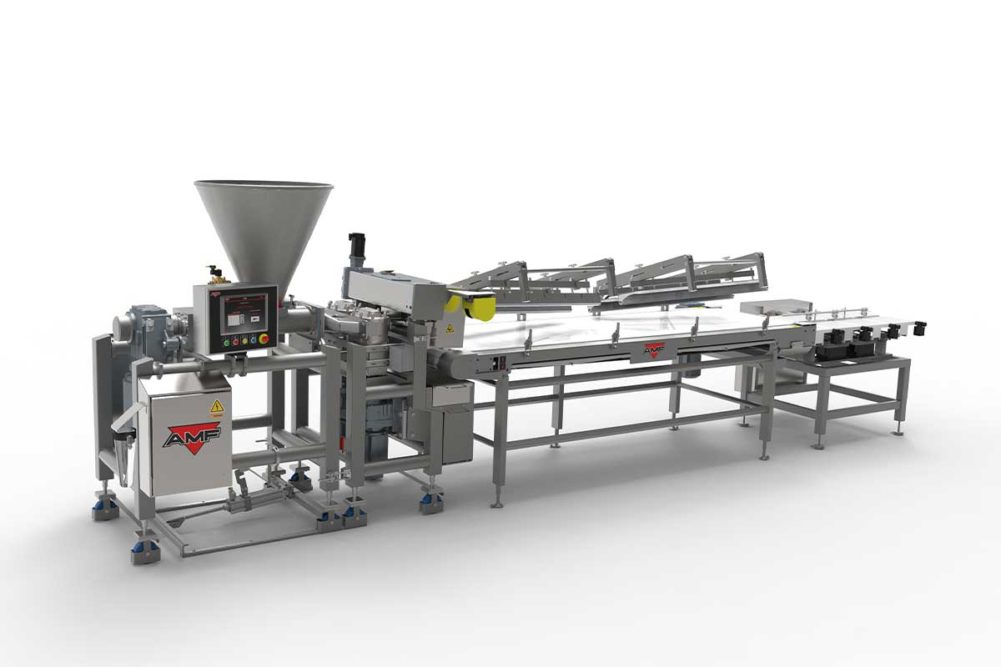Dividers and rounders must check a few boxes for bakeries. Accuracy comes first, as bakeries need to make sure dividers are hitting weight or volume targets without going over, which can be challenging with yeast-raised products in bakeries with fluctuating temperatures. Rounders need to be flexible and gentle, sealing the seams and creating a fine skin while applying just the right amount of pressure for the baked foods they’re making.
Whether bakeries divide dough by weight or volume, reducing giveaway is important as ingredient costs skyrocket and shortages continue to plague the entire supply chain.
“Twenty-five years ago, weight control wasn’t so important because bakery ingredients were cheap; it’s not that way anymore,” said Ken Hagedorn, vice president of the bakery sector for Handtmann. “Bakers have really got to watch it. Even flour is really expensive now. So weight control becomes more and more important.”
Advanced equipment has checkweighers that are communicating with dividers, ensuring accuracy as machinery runs hour after hour. But bakeries must follow some best practices to keep things rolling along.
Keeping equipment clean and maintained is vital to ensuring that dividers and rounders run at peak efficiency. Sanitation frequency often depends on the product itself.
“With the English muffin doughs, they’re pretty sticky so you’re cleaning those more often versus a hamburger bun line that’s not as sticky, so they’ll run longer and cleaner,” said Jim Fontaine, bakery field sales manager, Reiser. “But they’ll run longer and cleaner as long as the bars and bed are kept in good condition. So if one bar starts to wear, you’ll get more slippage and you’ll get more doubles in the bars, and it creates a mess.”
Loss of pressure by poor cleaning and improper maintenance can cause excessive wear and tear on equipment, said Jerry Murphy, vice president of sales, Gemini Bakery Equipment/KB Systems. He suggested taking advantage of changeovers to complete spot cleaning to remove any excessive dough waste.
Failure to clean the dividing chamber can degrade its accuracy, said Nate McDermott, director of customer service, WP Bakery Group USA. He also stressed the importance of maintenance.
“Keep the moving parts lubricated with dividing oil, make sure your dividing chamber, including ram, knife, pistons, head and bed, are cleaned every eight hours,” Mr. McDermott advised. “Dried dough becomes abrasive cement, and it will eat away at this critical area.”
Maintenance is especially important as equipment becomes more advanced, said John Giacoio, vice president of sales, Rheon USA.
“As machines become more sophisticated with sensors and load cells, they need to be maintained for optimal performance,” he said. “These advances in design reduce the people needed and increase quality and accuracy, but they also need to be maintained.”
Dividers and rounders used by large wholesale bakers are designed to run continuously as long as bakeries are performing recommended tasks.
“A short weekly preventative maintenance is suggested to ensure against unplanned downtime, but they can run weeks on end,” Bruce Campbell, executive product manager, AMF Flex, an AMF Bakery Systems brand, said of extrusion dividers like AMF Flex dividers and ADD-S.
He added that volumetric dividers require periodic sanitation as dough buildup in areas will affect scaling and dough piece placement.
Maintenance has become tougher for bakeries that may be struggling to keep the right people on staff with the constant labor shortages.
“One of the first things companies cut back on is maintenance staff, and some are even having a hard time finding maintenance people,” Mr. Hagedorn said. “I think a lot of their preventative maintenance programs get thrown out the window.”
This article is an excerpt from the October 2022 issue of Baking & Snack. To read the entire feature on Dividing & Rounding, click here.





